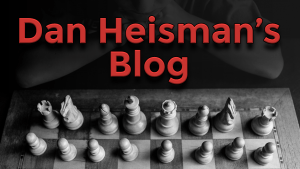
How To Play When You're Winning Easily
In all sports, you play much differently when you are winning easily.
- In baseball, if you are leading 8-0 in the 8th inning, you would not pull your fresh relief pitcher out of the game to pinch hit and try to get another run.
- In soccer, if you are ahead 7-0 with 3 minutes left to play, you would not pull your keeper or send all your defenders up the field to try to score another goal.
- In football, if you were up 70-0 with 3 minutes left to play, you would not throw long bombs or maneuver yourself to the middle of the field to get a better chance to kick a field goal.

What?! That wasn't the safe play?!
This philosophy is also true in chess. When you are way ahead, you should play quite differently than you would if the game were still competitive, or if you were losing.
Strong players understand this concept. They win the games which they are winning easily with such a high frequency that the other good players simply resign lost positions.
However, in lower-level amateur play, the players with easily winning positions often don't understand that their strategy should be much different. They implement questionable strategies that often allow their opponents to draw or even come back and win lost positions. This, in turn, means that their opponents are understandably much less likely to resign.
What should you do when you are winning easily? First, let's define different degrees of advantage.
- If your position is advantageous, but not won with perfect play, then we say White is better. Books note this with "+/=" or "+/-."
- If your position is so much better that with perfect play, you can just squeak out a win, then you are winning (noted in books as "+-"), but the position may be said to be "barely winning."
- If you are winning easily, then you should be able to win with less than perfect play. The difference between this case and the second (barely winning) I call the "Margin for Error." In the winning-easily case, the margin for error is large.
For example, suppose a computer evaluation of +1 early in the game marks the difference between White winning (more than +1 ahead) or just having the advantage (greater than 0 but less than +1). Then White's Margin for Error = Evaluation - 1.

Uh... Ya lost me...
For example, if White is ahead 2.5 pawns, his margin for error (to still be winning) is 2.5 - 1, or 1.5 pawns. He could "lose" the equivalent of 1.5 pawns and possibly still be winning.
OK, but what do you need to do when you are winning easily? Look at it this way: Suppose you have a million ways to win, but only three ways you can mess up and let your opponent back in the game. Then wouldn't it makes sense to ask yourself, "What are ALL the ways I could lose (or draw) this game?" and then make sure none of those ways could ever occur?
For example, suppose you are winning easily (say you are ahead a rook for no compensation), but your king is set up so that it can be easily back-rank mated. Even though a back-rank mate is currently not possible, why wait and use your extra rook to win a pawn when you could play a move which permanently stops the mate, like h2-h4 or Kg1-Kf1. With an extra rook, you can always win a pawn later.
I call this idea of putting yourself in your opponent's shoes and asking how the opponent would get back into the game, and then stopping it, "Think Defense First". I am often misquoted in this regard as suggesting players "Play Defensively" or even "Play Passively" but nothing could be further from the truth. You can play as aggressively as you wish. Instead, it's a matter of ordering your priorities. If there are three defensive ideas you need to consider, and 97 offensive ones, review the three first. If they are all permanently stopped, go on the offensive. "Think Defense First" is an ordering which allows aggression. "Think Defensively" is a mindset which discourages aggression.

Defense is number one? Are you sure? Cuz aggression has been working... not that well...
Suppose you are ahead a knight with an easy win and you can create a complication where someone is bound to win a knight. Would you do it? Of course not! If you win the knight and are ahead two knights, you are still winning easily. The extra knight is helpful but it doesn't change the evaluation. However, if your opponent wins the knight, then you have lost your advantage and the material is now even. Thus you have almost nothing to gain and everything to lose from such complications. This is true even if the odds are in your favor. If there is a 99% chance you will be the one winning the second knight and only a 1% chance your opponent will win the knight and be even, you still have little to gain and everything to lose. Complications favor the player who is losing so the "KISS" ("Keep It Simple, Stupid!") principle is in play.

The most well-known strategy when you are winning easily is "trade pieces'" but that is a little simplistic. I prefer to state it, "Make fair trades of pieces, but not necessarily pawns." In some positions where there are few pawns on the board, trading pawns can throw away a win because you can't checkmate with only one extra knight or bishop. You need to be a rook ahead or else you need to promote a pawn. On the other hand, if the board is almost all locked up and your extra piece is not enough to sacrifice to break through, then trading pawns to open lines for your extra piece is fairly mandatory.
There are three more things you want to do when you are way ahead, but they are not quite as important as the big three. In summary, let's list all six:
- Think Defense First
- Keep It Simple
- Make Fair Trades of Pieces but not Necessarily Pawns
- Use All Your Pieces All the Time (like in a hockey power-play)
- Don't Worry About the Little Things (If you are ahead a rook and trading queens doubles your pawns, trade queens!)
- Don't Get Into Unnecessary Time Trouble (If you are playing 40 moves in 2 hours don't get to the 40th move with 1 minute left on your clock. You should be able to win more safely by not cutting it quite so close).
Here's an extreme example of how I play when I am winning easily.
White can temporarily stop the back rank mate with 1.Qb2+. Even better, he can permanently stop the mate with a move like 1.h3. More aggressive would be 1.g4 or 1.h4. In all similar positions, I would quickly and permanently solve all problems with 1.Qxd5. This is clearly a case of, "It's not what you trade off the board that matters; it's what's left on the board." Here White was ahead a queen so he can easily afford to give up a queen for a rook and take away all of Black's reasons for not resigning. The margin for error was so high that giving up a queen for a rook makes the win easier, not harder.
After 1.Qxd5 exd5, my next step would be to play 2.Kf1 and place my king in front of the passed black d-pawn. Once the white king reaches the d-file, Black has absolutely no play at all, and either Black will resign or White will win easily with no danger and nothing to "Think Defense" about.






